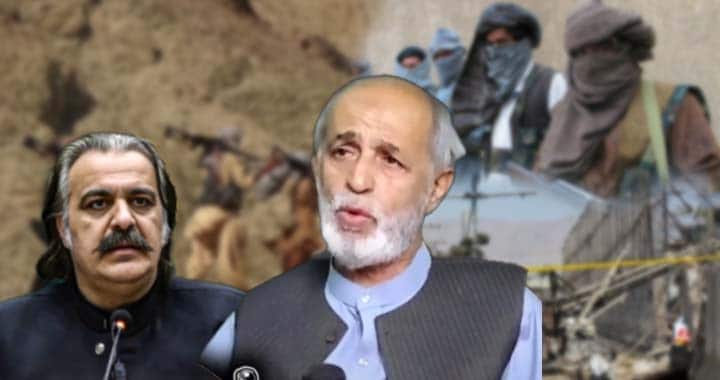Shamim Shahid
For months now, the people of Khyber Pakhtunkhwa have paid the price for a governance calculus that treats security as an afterthought. While protests, political posturing and the drama surrounding national leaders dominate headlines and occupy official energy, the province’s streets have grown less safe: hundreds of violent incidents, scores of dead policemen and civilians, and thousands wounded. This is not an abstract failure of policy it is a failure of priorities, and it is costing lives.
From January through the end of August this year, the province witnessed an alarming wave of violence: hundreds of terrorist attacks and a heavy toll on both security personnel and ordinary citizens. The figures are stark — dozens of police officers and more than a hundred civilians killed, and roughly a thousand injured and they tell a simple story: the writ of the state is under strain. Yet, at the same moment, the attention of ruling elites has been absorbed by political crises and street protests. The result is that public safety has slipped down the agenda.
It is not merely the volume of violence that worries me; it is the way our institutions have been hollowed out while political fights rage. When a government any government places its energies on contestation and narrative management rather than sober, continuous governance, the most vulnerable lose out first.
Khyber Pakhtunkhwa’s police establishment remains substantial in numbers on paper, but thin where it matters. There are roughly nine-figure personnel counts when one adds civil police and auxiliary tribal or local forces; yet a disproportionate share of manpower is siphoned off into VIP protection and static duties. Elected representatives and other dignitaries routinely receive multiple security details; each deployed guard is one fewer patrolling the marketplace, guarding the school or running evening foot patrols. That imbalance has practical consequences: increased mobile snatching, robberies, bank heists and a palpable fear in city streets after dark.
Worse, political interference has become routine. Transfers and postings of senior officers DPOs, SPs, DSPs are frequent and driven by political considerations rather than operational necessity. When the continuity of command is broken, institutional memory and local expertise vanish with each reshuffle. The old working relationship between the SP and the deputy commissioner once two complementary pillars of district order has been weakened. Fragmentation between police and civil authorities has become a security liability.
Counterterrorism is a technical, demanding field that requires sustained training, modern policing doctrines and specialized units. Years ago, CTD personnel were slated for upgraded courses and separate training pipelines, but implementation has lagged. Equipment and human capital cannot be conjured overnight; they require an administrative culture that treats investment in readiness as permanent, not episodic. Where training is deferred and promises are repeatedly postponed, capability erodes.
To be fair, our security forces do act. This year alone, operations against militants have been conducted hundreds in number and those operations have produced tangible results: arrests and the deaths of several hundred identified militants. But operations without an integrated political strategy, community engagement and law-enforcement reform are band-aids. They blunt immediate threats but do not eliminate the enabling conditions that allow militancy to regenerate: weak institutions, unaddressed grievances, and local patronage networks.
Cross-border dynamics and sanctuaries
The problem is not purely domestic. Militants and command structures in neighbouring Afghanistan provide sanctuary and operational depth that complicates local countermeasures. There are tens of thousands of fighters some estimates put regional militant cadres far larger than those operating inside Khyber Pakhtunkhwa alone — and while rivalries and fractures exist among groups, they unite when it comes to violence. Any durable solution therefore requires a regional dimension: intelligence cooperation, diplomatic engagement and pressure against sanctuaries. Absent that, tactical successes will be repeatedly followed by militant regeneration.
Recent talk of external powers revisiting former facilities such as Bagram Air Base and of renewed strategic interest in Afghanistan underline the fluidity of the region. External actors can influence battlefield dynamics, safe havens and the flow of weapons and fighters. Pakistani security planning must factor in these broader shifts: contingency planning is not paranoia it is prudence.
If the province is to arrest this slide, several practical steps should be immediate:
Depoliticize policing. End routine political interference in postings and transfers. Allow senior officers to serve meaningful tenures so they can build local knowledge and accountable institutions. Rebalance force allocation. Scale down excessive VIP detachments and reassign those personnel to community policing, night patrols and anti-crime units. VIP security must be efficient, not voracious. Invest in training and CTD capability. Deliver on specialised training pipelines, equip CTD and rapid-response units, and institutionalize regular joint exercises with other branches of security. Restore police–civil coordination. Rebuild the SP–DC partnership model for district governance so law-and-order and administrative responses are synchronized. Pursue regional engagement. Push for practical, verifiable arrangements with neighbouring authorities to disrupt sanctuaries and stem cross-border flows of fighters and materiel. Transparent accountability. Where failures occur operational or managerial investigate transparently and hold leaders to account so public trust can be rebuilt.
Security is not a side issue. For families who have lost loved ones in bombings, or for shopkeepers who no longer open after dusk, it is existential. The public does not care for partisan score-settling when its children cannot attend school safely, or when police memorials accumulate names. Political energy that could be spent shoring up the basic bargaining of the state — security, justice and service delivery — instead is often consumed by other fights. That must change.
Khyber Pakhtunkhwa needs a government that treats safety as daily governance not as an occasional headline. That requires political will: the resolve to subordinate short-term political advantage to the long-term safety and prosperity of ordinary citizens. Without that shift, the cycle of violence and reaction will continue, and the province will remain a place where politics and protests matter more than the lives they are supposed to protect





